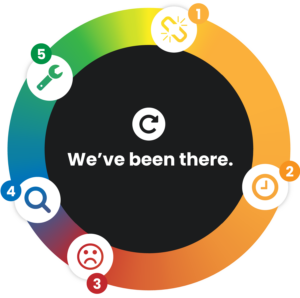Reactive MarTech data management often leads to crisis mode and inefficiency. We’ve been there, and we understand how it feels having to answer to executives who are wondering why their reports have broken (again), consent management is not being honored (again), and they’re coming to you to complain (again). It’s exhausting, repetitive, and deflating.
However, by adopting a forward-thinking approach and continuous monitoring, you can streamline operations and prevent issues from becoming critical failures. Here’s how you can shift from firefighting to proactive MarTech data management.
1. Understand the Limitations of Auditing
Auditing provides a snapshot of your data at a single point in time. While useful, audits often miss ongoing issues that can emerge over time. Continuous monitoring, on the other hand, offers real-time insights, allowing you to catch and resolve problems as they occur. This proactive approach helps ensure that data integrity is maintained, reducing the risk of long-term issues that could undermine marketing strategies.
Moreover, auditing requires significant time and resources, often leading to delayed issue detection and resolution. Continuous monitoring, however, can automate these processes, providing a constant watch over your MarTech stack. This not only frees up your team to focus on more strategic tasks but also enhances your ability to respond swiftly to any anomalies, ensuring that your data remains reliable and accurate at all times.
2. Embrace Real-Time Monitoring Tools
Real-time monitoring tools like Sentinel Insights provide immediate visibility into your MarTech stack. They detect anomalies, track changes in the data layer, and alert you to potential issues before they escalate. This proactive stance not only saves time but also ensures data integrity. Implementing such tools can significantly reduce the time spent on manual checks and troubleshooting, enabling your team to focus on optimizing performance.
Advanced monitoring solutions offer detailed analytics and reporting features, allowing you to dive deep into data patterns and identify underlying issues. By integrating these tools into your workflow, you can maintain a high level of data quality, support compliance requirements, and drive more informed decision-making. These tools act as a safeguard, ensuring that your MarTech investments deliver maximum ROI without the constant need for manual oversight.
3. Automate Documentation and Updates
Manual documentation is time-consuming and prone to errors. Automated tools can generate up-to-date documentation based on real-time data, ensuring accuracy and saving your team valuable time. This allows your team to focus on strategic tasks rather than mundane data management. Automation not only improves efficiency but also ensures that your documentation remains current, reflecting any changes made in real-time.
Additionally, automated documentation tools can help maintain consistency across different teams and projects. This is particularly important in complex MarTech environments where multiple stakeholders need access to accurate and up-to-date information. By reducing the administrative burden on your team, you can enhance collaboration and ensure that everyone is working with the same reliable data, leading to better project outcomes and reduced risk of miscommunication.
4. Foster a Culture of Proactivity
Encourage your team to adopt a proactive mindset. Regular training and upskilling in the latest best practices for data collection can improve their ability to anticipate and prevent issues. A proactive culture reduces the need for crisis management and boosts overall efficiency. Investing in ongoing education ensures that your team stays ahead of industry trends and can effectively manage the complexities of modern MarTech stacks.
Creating a proactive culture also involves setting clear expectations and providing the necessary tools and resources. Encourage team members to take ownership of their work and to actively seek out potential improvements. By fostering an environment where proactive behavior is rewarded and supported, you can drive continuous improvement and innovation within your organization, ultimately leading to more effective and resilient MarTech operations.
5. Enhance Collaboration Across Teams
Effective MarTech data management requires seamless collaboration between marketing, IT, legal, and data teams. Implementing collaborative tools and practices ensures that everyone is on the same page and can act quickly when issues arise. This collective effort leads to more robust and reliable data management. Cross-functional collaboration helps in leveraging diverse expertise, ensuring that all aspects of data management are covered comprehensively.
To enhance collaboration, establish regular communication channels and workflows that facilitate information sharing and joint problem-solving. Use project management and collaboration platforms to keep track of tasks, progress, and issues. By breaking down silos and promoting a team-oriented approach, you can ensure that your MarTech initiatives are well-coordinated and that any challenges are addressed promptly and effectively.
6. Leverage Insights for Continuous Improvement
Continuous monitoring provides a wealth of data that can be analyzed to identify trends and areas for improvement. Use these insights to refine your strategies, optimize your MarTech stack, and enhance your overall marketing performance. By regularly reviewing and acting on monitoring data, you can stay ahead of potential issues and continuously improve your data management processes.
Implementing a feedback loop where insights from monitoring inform future strategies is key to maintaining an agile and responsive MarTech operation. Encourage your team to regularly review performance metrics and to use these insights to drive innovation and efficiency. By leveraging the full potential of continuous monitoring, you can ensure that your MarTech stack remains robust, adaptable, and aligned with your overall business goals.
Conclusion
Transitioning from a reactive to a proactive approach in MarTech data management is essential for maintaining data quality and improving efficiency. After all, this is a big part of the reason why we built a MarTech monitoring platform.
By embracing continuous monitoring and fostering a proactive culture, you can reduce crisis management, save time, improve morale, and drive better marketing results. For more insights on transforming your MarTech data management, we’d love to chat about Sentinel Insights’ real-time monitoring solutions and see how they can help your organization stop firefighting.






